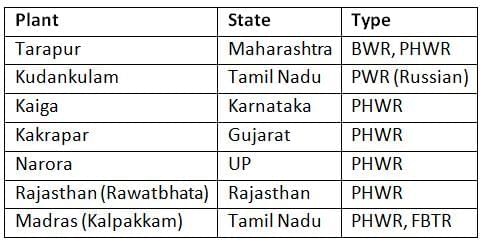UPSC Exam > UPSC Notes > Science & Technology for UPSC CSE > Cheat Sheet: Nuclear Energy and Renewable Energy
Cheat Sheet: Nuclear Energy and Renewable Energy | Science & Technology for UPSC CSE PDF Download
Nuclear Energy
Basics
Energy released from nuclear fission (splitting heavy atoms like Uranium-235) or nuclear fusion (combining light atoms like hydrogen isotopes).
India’s Status:
- Nuclear energy share in total installed capacity: ~1.7% (2024).
- Governed by Atomic Energy Act, 1962.
- Civil nuclear cooperation under International Atomic Energy Agency (IAEA) safeguards.
India’s Nuclear Power Plants

India’s 3-Stage Nuclear Programme (Homi Bhabha Plan)
- Stage 1: PHWRs using natural uranium → produce plutonium-239.
- Stage 2: Fast Breeder Reactors (FBRs) using plutonium-239 + uranium-238/thorium-232.
- Stage 3: Advanced reactors using thorium-232 → U-233.
Fuel Cycle in India
- Uranium from Jaduguda, Jharkhand; imports from Kazakhstan, Canada, Russia.
- Thorium abundant (beach sands in Kerala, Odisha, Andhra Pradesh).
Advantages
- Low greenhouse gas emissions.
- High energy density.
- Continuous (base-load) power supply.
Concerns
- High initial cost.
- Radioactive waste disposal.
- Nuclear accidents (e.g., Chernobyl, Fukushima).
- Public opposition.
Renewable Energy
Energy from sources that are naturally replenished — solar, wind, hydro, biomass, geothermal, tidal, etc.
India’s Status
- Installed capacity (2024): ~180 GW renewable (~43% of total capacity).
- Targets:
- 175 GW by 2022 (achieved partially).
- 500 GW non-fossil capacity by 2030 (Panchamrit targets).
- Nodal Ministry: Ministry of New and Renewable Energy (MNRE).
Types of Renewable Energy & Key Schemes
 Advantages
Advantages- Environmentally friendly.
- Reduces fossil fuel dependence.
- Creates rural jobs.
Challenges
- Intermittency of supply (solar/wind).
- Land acquisition issues.
- High transmission costs for remote areas.
Nuclear vs. Renewable – Quick Comparison

The document Cheat Sheet: Nuclear Energy and Renewable Energy | Science & Technology for UPSC CSE is a part of the UPSC Course Science & Technology for UPSC CSE.
All you need of UPSC at this link: UPSC
|
90 videos|490 docs|209 tests
|
FAQs on Cheat Sheet: Nuclear Energy and Renewable Energy - Science & Technology for UPSC CSE
| 1. What are the main differences between nuclear energy and renewable energy sources? |  |
Ans. Nuclear energy is generated through the fission of atomic nuclei, primarily uranium-235 or plutonium-239, leading to a large release of energy. In contrast, renewable energy sources, such as solar, wind, hydro, and biomass, harness natural processes to produce energy with minimal environmental impact. Nuclear energy provides a stable, continuous power supply but raises concerns about radioactive waste and potential accidents. Renewable energy is sustainable and reduces greenhouse gas emissions but can be intermittent, depending on weather conditions.
| 2. What are the advantages of using nuclear energy over renewable energy? |  |
Ans. The advantages of nuclear energy include its ability to produce large amounts of energy from a small fuel volume, providing a consistent and reliable power supply. It has a lower land footprint compared to some renewable sources, like solar farms and wind turbines. Additionally, nuclear power plants emit negligible greenhouse gases during operation, helping to combat climate change. However, the long-term management of radioactive waste and the risk of nuclear accidents are significant challenges.
| 3. What are the environmental impacts of nuclear energy compared to renewable energy? |  |
Ans. Nuclear energy has a relatively low carbon footprint during operation, but the mining and processing of uranium and the management of radioactive waste pose environmental challenges. In contrast, renewable energy sources are generally more environmentally friendly, as they produce little to no emissions during operation. However, they can still have environmental impacts, such as habitat disruption or land use changes associated with large installations for wind and solar energy.
| 4. How do the costs of nuclear energy compare to those of renewable energy? |  |
Ans. The initial capital costs for nuclear power plants are typically higher than those for renewable energy installations due to the complex technology and safety measures required. However, nuclear plants can operate for several decades, providing long-term energy at stable costs. Renewable energy costs have decreased significantly in recent years, making them increasingly competitive, especially with advances in technology and economies of scale. The overall cost-effectiveness can vary based on location, resource availability, and regulatory frameworks.
| 5. What is the future outlook for nuclear energy and renewable energy? |  |
Ans. The future of nuclear energy may involve advancements in technology, such as small modular reactors (SMRs) and next-generation reactors that promise enhanced safety and efficiency. However, public perception and regulatory challenges may hinder its expansion. Conversely, renewable energy is expected to continue its growth trajectory, driven by technological innovations, decreasing costs, and global efforts to transition to cleaner energy sources. The integration of both nuclear and renewable energy could play a crucial role in achieving energy security and sustainability.
Related Searches
















